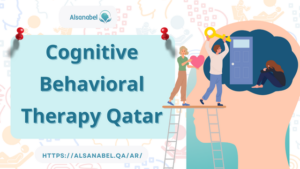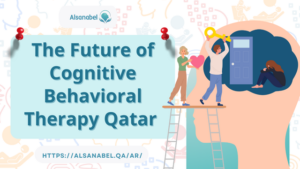The Benefits of Cognitive Behavioral Therapy Qatar for Mental Health 2024
- Category Best psychiatrist in Qatar
Cognitive Behavioral Therapy Qatar helps individuals understand the connection between their thoughts, feelings, and behaviors, enabling them to develop healthier thinking patterns and coping strategies. In this article, we will explore the numerous benefits of CBT for mental health in Qatar, highlighting how this therapeutic approach can lead to significant improvements in emotional well-being and overall quality of life.
Cognitive Behavioral Therapy Qatar
Cognitive Behavioral Therapy (CBT) is a widely recognized and extensively researched form of psychotherapy that focuses on the relationship between thoughts, emotions, and behaviors. It is grounded in the understanding that our thoughts and interpretations of events significantly influence how we feel and behave. Here’s an introduction to CBT in Qatar:

Key Concepts and Techniques in CBT in Qatar:
- Thought Records (Cognitive Diary): Clients learn to track and record their thoughts in response to specific situations or triggers. They then analyze these thoughts to identify patterns of thinking that contribute to distress and practice generating alternative, more adaptive responses.
- Behavioral Experiments: Clients engage in structured experiments to test the accuracy of their beliefs or predictions about themselves, others, or the world. This process helps challenge assumptions and build confidence in adopting new behaviors or perspectives.
- Graded Exposure: Used primarily in treating anxiety disorders, graded exposure involves gradually facing feared situations or stimuli. Through repeated exposure in a controlled and systematic manner, clients learn that their feared outcomes are unlikely or manageable, reducing anxiety over time.
- Skills Training: CBT often includes teaching clients practical skills such as problem-solving, assertiveness, stress management, and relaxation techniques. These skills help individuals cope more effectively with stressors and improve their overall resilience.
Applications of Cognitive Behavioral Therapy Qatar:
- Depression: CBT is highly effective in treating depression by targeting negative thinking patterns and promoting behavioral activation.
- Anxiety Disorders: It is a first-line treatment for various anxiety disorders, including generalized anxiety disorder, social anxiety disorder, phobias, and panic disorder.
- Trauma and PTSD: CBT techniques like exposure therapy and cognitive processing therapy are used to process traumatic experiences and reduce PTSD symptoms.
- Substance Use Disorders: CBT helps individuals identify triggers for substance use, develop coping strategies, and prevent relapse.
- Eating Disorders: CBT-E (Enhanced Cognitive Behavioral Therapy) is effective in treating eating disorders such as bulimia nervosa and binge eating disorder.
Cognitive Behavioral Therapy (CBT) is valued for its structured, collaborative approach and its ability to empower individuals to actively participate in their treatment and achieve lasting changes in their thinking patterns, emotional responses, and behaviors. Its evidence-based nature and versatility make it a cornerstone in mental health Qatar treatment across various populations and conditions.
Embracing CBT for a Healthier Mindset
Embracing Cognitive Behavioral Therapy (CBT) can significantly contribute to cultivating a healthier mindset and improving overall mental well-being. Here are several ways in which CBT in Qatar can help:
- Understanding Thought Patterns: CBT helps individuals become aware of their thought patterns and how they influence emotions and behaviors. By identifying and challenging negative or distorted thoughts, CBT promotes more realistic and balanced thinking.
- Changing Negative Beliefs: CBT focuses on modifying harmful beliefs about oneself, others, and the world. By replacing negative beliefs with more adaptive and constructive thoughts, individuals can reduce self-criticism, guilt, and pessimism.
- Developing Coping Strategies: CBT equips individuals with practical coping strategies to manage stress, anxiety, and other emotional challenges. Techniques such as relaxation exercises, problem-solving skills, and mindfulness can help regulate emotions and enhance resilience.
- Behavioral Activation: CBT encourages behavioral changes that promote a healthier lifestyle and improve mood. This may include setting achievable goals, increasing activities that bring pleasure or satisfaction, and breaking the cycle of avoidance behaviors.
- Addressing Specific Issues: CBT is highly adaptable and can target specific mental health issues such as depression, anxiety disorders, phobias, OCD, PTSD, and eating disorders. Psychiatrist in Qatar tailor treatment plans to address individual needs and symptoms effectively.
- Structured and Collaborative Approach: CBT sessions are structured and goal-oriented, focusing on present-day problems and practical solutions. Therapists and clients work collaboratively to set goals, monitor progress, and adjust strategies as needed.
- Promoting Self-Efficacy: Through CBT, individuals develop a sense of mastery and self-efficacy in managing their thoughts, emotions, and behaviors. This empowerment fosters confidence and a proactive approach to facing life’s challenges.
- Long-Term Benefits: CBT not only provides immediate relief from distressing symptoms but also equips individuals with lifelong skills for maintaining mental well-being. The strategies learned in therapy can continue to benefit individuals even after treatment concludes.
- Integration with Other Therapies: CBT can be used alone or in conjunction with other therapeutic approaches, medication, or lifestyle modifications. This integrated approach ensures comprehensive care tailored to individual needs.
- Preventative Tool: Beyond treating existing mental health issues, CBT serves as a preventative tool by teaching resilience skills, stress management techniques, and effective problem-solving strategies to reduce the risk of future relapses or difficulties.
By embracing CBT, individuals can proactively enhance their mental health, develop healthier coping mechanisms, and achieve a more balanced and fulfilling life. It’s recommended to seek guidance from a qualified therapist or psychiatrist in Qatar trained in CBT to maximize its benefits for your unique circumstances.
The Future of Cognitive Behavioral Therapy Qatar
The future of Cognitive Behavioral Therapy CBT in Qatar looks promising, driven by several factors and developments:

- Increasing Awareness and Acceptance: There is growing awareness and acceptance of mental health issues in Qatar, leading to greater recognition of the effectiveness of CBT as a treatment for various psychological disorders.
- Integration into Healthcare Systems: CBT is increasingly integrated into Qatar’s healthcare systems, both in public institutions like Hamad Medical Corporation (HMC) and private healthcare providers. This integration enhances accessibility to CBT for residents across different segments of society.
- Training and Expertise: There is a focus on training best psychiatrist in Qatar in CBT techniques and methodologies. This includes psychiatrists, psychologists, counselors, and other mental health professionals, ensuring they are equipped to deliver high-quality CBT services.
- Research and Evidence-Based Practice: Continued research and studies on the efficacy of CBT in diverse populations contribute to its evidence-based practice in Qatar. This research informs clinical guidelines and treatment protocols, further enhancing the credibility and adoption of CBT.
- Multicultural Adaptation: CBT practices in Qatar are adapting to the cultural context and needs of the population. This involves incorporating cultural sensitivity into therapy sessions and addressing cultural beliefs and values that influence mental health and treatment-seeking behaviors.
- Telehealth and Digital Platforms: The adoption of telehealth and digital platforms for mental health services, including CBT, is on the rise in Qatar. These technologies improve access to therapy, particularly in remote areas or during times when in-person visits are challenging.
- Collaborative Care Models: There is a trend towards collaborative care models where CBT is integrated with other treatment modalities, such as medication management, psychoeducation, and lifestyle interventions. This holistic approach ensures comprehensive and personalized care for patients.
- Community Support and Advocacy: Increasing community support and advocacy for mental health awareness and services contribute to the sustainability and growth of CBT in Qatar. Organizations and initiatives promote mental health education, destigmatization, and access to treatment options like CBT.
In conclusion, Cognitive Behavioral Therapy Qatar offers significant benefits for mental health, providing effective strategies for managing and overcoming a variety of psychological issues. By focusing on changing negative thought patterns and behaviors, CBT helps individuals develop healthier coping mechanisms and improve their overall quality of life. As mental health awareness continues to grow in Qatar, the accessibility and utilization of CBT can play a crucial role in fostering a mentally resilient and healthier society.









